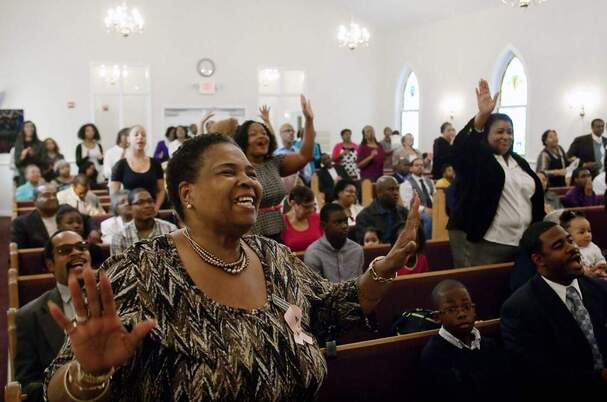My father died many years ago when I was a young adult. I also experienced the deaths of all my grandparents and a brother. I grieved differently each time.
My most intense period of grief after the death of my wife. I had watched her grieve, and I had watched others grieve, and I had personal periods of grief, but I had really no idea of how to grieve. There are no books on how to grieve. The books that claim to help you grieve all say that everyone grieves differently so there is no checklist, or proforma.
As a Pastor I'm called when someone has lost a loved one. I guess they think that I know the right words to say. I didn't have the right words for my wife and I didn't have the right words for myself when she died. What I have learned is that the most important thing you can do when someone has lost a loved one is to just be there.
My sister-in-law, the mother of my niece and nephew, died a few weeks ago. My niece and nephew are very different and each one is grieving differently. Something my niece said really struck me. She said "we have to work through this our way and we don't really care what anyone else thinks. People are making suggestions about services and memorials but we don't care what they think."
I agree with her grief is a personal matter.
It’s okay to grieve. When people are Christians, we know they will go on to heaven, so we need not grieve like the world. Our grief can be different. We grieve because we’re going to miss them, but we can also be at peace because we know they are with God.
There’s a myth that says God wants you to walk around with a smile on your face all the time saying, “Praise the Lord!” The Bible doesn’t say that anywhere. In fact, Jesus taught the exact opposite.
Matthew 5:4 (NLT2) 4 God blesses those who mourn, for they will be comforted.
(emphasis mine).
Anne Peterson gives us some things to think about as we want to show our love and support for those grieving. I'll try to remember them in loving and supporting my niece and nephew and others.
3 Things Every Griever Needs (and What They Don’t)
Anne Peterson (Note: Scriptures added by me)
When people we love are grieving, we hurt for them. We want to somehow stop their pain.
So we offer the griever words intended to help but sometimes they don’t. And even when we say things perfectly, we don’t know how they are processing it with their broken hearts.
Job’s comforters were doing okay until they spoke.
So how can we help those who grieve?
1. Give them your presence.
When Jesus was in the Garden of Gethsemane, he asked his disciples for one thing. He wanted them to wait with him.
Mark 14:37 (NLT2) 37 Then he returned and found the disciples asleep. He said to Peter, “Simon, are you asleep? Couldn’t you watch with me even one hour?
Being with someone in grief is a gift to the griever.
We’re tempted to let them know they are not alone, that we know how they feel, we understand. But fight that temptation. They’ll know they’re not alone when you show up.
And even if we’ve experienced similar losses, we don’t know how they feel. We’re not them.
The moment we start sharing that we understand is the moment true communication stops. The focus shifts from them to us. We don’t do this consciously, it’s just that we don’t want them to feel alone.
Sometimes we’re afraid if they talk about their loved one they will hurt. The truth is, they do hurt. It’s always on their minds.
One of the biggest fears a griever has is that their loved one will be forgotten. We can alleviate that fear just by listening to stories. It’s one way they can keep honoring their loved one. By listening, we also honor both the griever and the one they lost.
And sometimes we can share on a deeper level. We can do what it tells us in Romans 12:15.
Romans 12:15 (NLT2) 15 Be happy with those who are happy, and weep with those who weep.
Jesus didn’t just give us advice that he didn’t experience himself.
John 11:33-35 (NLT2) 33 When Jesus saw her weeping and saw the other people wailing with her, a deep anger welled up within him, and he was deeply troubled.
34 “Where have you put him?” he asked them. They told him, “Lord, come and see.”
35 Then Jesus wept.
He shared tears with his friends who were hurting. Jesus, who knew he was about to raise Lazarus from the dead, wept. His tears showed he was in it with them.
2. Give them patience.
Grief takes time. Lots of time. Let them be where they are, not where you wish they’d be. We can’t decide how long someone’s grief should last.
Countless books are written about grief. They define the different stages of grief that people go through, describing each one as if it were a sort of road map. But grief isn’t so cut and dry.
Each person is different. Some grieve outwardly, talking freely about their lost loved one. Others are more quiet. Their feelings are just as real but how they express them is different.
Sometimes your griever will say things they don’t mean. Sometimes they will pull back from you. At those times they need your understanding. Ask God for grace to extend to them over and over. God never runs out.
3. Give them your prayers.
We don’t know exactly how our griever feels, but God knows. He’s sovereign. He holds the keys of life and death, knowing exactly when we’ll breathe our last breath.
We are in the best position to lift our grieving person in prayer. Every time the griever is on your mind, lift them to the Father, just like it says in
1 Peter 5:7 (NLT2) 7 Give all your worries and cares to God, for he cares about you.
God cares about what concerns us.
And when the griever shares that his heart is broken, or how he feels raw, pray to the One who heals broken hearts, the only One who can restore them.
You can even be silently praying while you are with them. For as much as you love your griever, God loves them more.
Fight the temptation to give them a verse. And please hear me. I’m not saying God’s Word is not helpful. I’m just saying they may not be in a place where they can receive it. And you don’t want them feeling guilty because they’re not ready.
With every fiber of his being, the person in grief is fighting to just hang on. While your heart means well in sharing verses, he knows the verses. But he’s in survival mode, trying to learn how to breathe without his loved one.
Pray the verses.
Tell the Lord you want him to show the griever his peace
Isaiah 26:3 (NLT2) 3 You will keep in perfect peace all who trust in you, all whose thoughts are fixed on you!
That you want him to comfort your friend.
2 Corinthians 1:4 (NLT2) 4 He comforts us in all our troubles so that we can comfort others. When they are troubled, we will be able to give them the same comfort God has given us.
 Photo credit: The Oklahoma Eagle
Photo credit: The Oklahoma Eagle
If you are tempted to use words as a source of comfort, try not to say the following:
- “Your loved one is not suffering any more.”
- “At least they are in heaven.”
- “You’re gonna see them again some day.”
In fact don’t start with any statement that says, “At least…” These statements tend to minimize where the griever is, which invalidates them.
And while these statements are all true, the grief is so excruciating all the griever wants is one thing. They want their loved one back.
They know their loved one is no longer suffering. They know they’ll see them again. But they are stuck in now. Eternity is a long way off.
Death is a real part of life. And one day we’ll be reunited with those we’ve lost. But until then, we will all experience losing a loved one.
If you really want to help those in grief, acknowledge they are on a journey. Maybe you can take it with them.

















 RSS Feed
RSS Feed